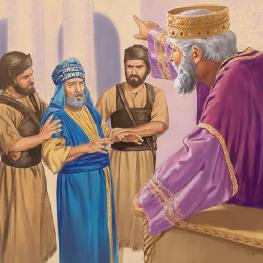Once we are in God’s Family, we must learn to practice forgiveness to all others, because if you don’t, you’re going to dam up the stream of God’s mercy. I cannot emphasize enough the importance of forgiveness. When we get saved, we are in the family. However, if we fail to forgive others over some matter, then we will destroy family fellowship.
I. The Compelling Reasons for Forgiveness
Why should you forgive? Let me give you some factors:
A. The Grace Factor
Why should I forgive you if you sin against me? Because, God has forgiven me when I sinned against Him. “Even as God for Christ’s sake hath forgiven you” (Ephesians 4:32). God has willingly, lovingly, freely forgiven us. We call that grace. The spirit of this verse of Scripture is: “And be ye kind one to another, tenderhearted, forgiving one another, even as God for Christ’s sake hath forgiven you” (Ephesians 4:32).
B. The Guilt Factor
Jesus said, “For if ye forgive men their trespasses, your heavenly Father will also forgive you; but if ye forgive not men their trespasses, neither will your Father forgive your trespasses” (Matthew 6:14-15). The person who refuses to forgive destroys the bridge over which he must travel. An unforgiving spirit is unforgivable. Forgiving and being forgiven go together. The only person who can afford not to forgive is the person who will never need forgiveness.

Notice the prayer: “Father, forgive us, as we forgive those…” (Matthew 6:12). Now, friend, if you don’t intend to forgive that person who has wronged you, that’s a very foolish and even a stupid prayer for you to pray. “Father, You treat me like I’m treating them. Father, forgive me as, in the same manner, I forgive others.” Now, you think about what you’re praying. You say, “Well, I’m not going to forgive the other person.” Then, “Father, don’t forgive me.” “Well, I’ll forgive her, but I’ll never have any more to do with her.” God says, “Okay. I’ll forgive you and never have any more to do with you.” You see what you’re asking? “Father, forgive us as, in the same manner that, we forgive those who sin against us.”
Jesus illustrated this truth with a story. In Matthew 18, Jesus is speaking about forgiveness, illustrates it this way: “Therefore is the kingdom of heaven likened unto a certain king, who would take account of his servants. And when he had begun to reckon, one was brought unto him, who owed him ten thousand talents.”
The story is about a man who is taking inventory. And, he finds out that a man owes the king ten thousand talents. “But forasmuch as he had nothing with which to pay, his lord commanded him to be sold, and his wife, and children, and all that he had, and payment to be made”- that is, he’s to be put in debtor’s prison-“The servant, therefore, fell down, and worshiped him, saying, Lord, have patience with me, and I will pay thee all. Then the lord of that servant was moved with compassion, and loosed him, and forgave him the debt” (Matthew 18:23-27).
If we are not careful, we will miss what Jesus was teaching. When He said, ten thousand talents, He was talking about an enormous debt. A talent was the largest measure of money known in the Roman world. It would be equal to the wages of 10,000 men for 17 years. In today’s dollars, it would be billions of dollars.
This man owes ten thousand talents. The word talent here literally means “without number.” Sometimes, the Bible translates it myriads. We get our word myriad from the Greeks. It means it’s some astronomical amount of money. This man is in debt. There is no way possible that he can pay, and the king forgives him. At that moment, it cost the king ten thousand talents.
Yet, here comes the point of the story. The man who had been forgiven then goes out and finds someone that owes him money. Jesus says,”But the same servant went out, and found one of his fellow servants, who owed him an hundred denarii”-now, a denarius is a day’s labor-“and he laid hands on him and took him by the throat, saying, Pay me what thou owe” (Matthew 18:28). Now, here’s a man who’d been forgiven myriads. Here’s a man who’s been forgiven billions, and he has somebody that owes him a hundred day’s wages, takes him by the throat, and says, “Pay me.” Yet, the man says, “I can’t pay you right now. Have mercy.” “And he would not, but went and cast him into prison, till he should pay the debt” (Matthew 18:30).

Do you see the analogy that Jesus is making? Jesus speaks of the wickedness of that man who had been forgiven and would not forgive. Then, Jesus said, the king, who was very wroth, had the man who had been forgiven, taken and put in prison. “So likewise shall my heavenly Father do also unto you, if ye, from your hearts, forgive not every one his brother their trespasses” (Matthew 18:35). Now, what is our Lord saying? Our Lord is saying, “It is absolutely wicked for those of us who have been forgiven so much to refuse to forgive somebody else.”
C. The Grief Factor
The grief factor is a reason we ought to forgive. This man who failed to forgive endured the severest discipline. The Bible teaches, “looking diligently lest any man fail of the grace of God”-that is, you fail to receive and give grace-“lest any root of bitterness springing up trouble you, and by it many be defiled” (Hebrews 12:15). If you don’t forgive, friend, you’re going to know unusual grief; you’re going to be troubled, and others around you are going to be troubled.

Sometimes, somebody says, “He did me thus and such harm. I’m going to get even.” Have you ever thought about what that means? You’re going to get even? You’re up here. Here’s some miscreant who does something bad to you, and he harms you, and you say, “Look what he did to me; I’m going to get even.” That’s what you do; you come down to his level. Well, you say, “Then I won’t get even; I’ll just continue to hate.” Well, if you continue to hate, what you’re doing is committing emotional suicide. What you’re doing is filling yourself with bitterness, which is an acid that will destroy you and hurt you as much, or more, than it does the person on whom it is poured.
D. The Gain Factor
Our Lord talks about somebody coming to the temple to worship, and they’re bringing a gift to the temple. He/she remembers that there’s a problem between him/her and someone else. Here’s what our Lord says you’re to do: “Leave there thy gift before the altar, and go thy way; first be reconciled to thy brother, and then come and offer thy gift” (Matthew 5:24).

Before we give our offering, if there is somebody we need to go make things right with, then we go be reconciled to our brother or sister. Then, we come and bring our offering.
Jesus said, “Moreover, if thy brother shall trespass against thee, go and tell him his fault between thee and him alone; if he shall hear thee, thou hast gained thy brother” (Matthew 18:15). In both Scriptures: One says, “be reconciled to thy brother,” and the other says, “thou hast gained thy brother” (Matthew 5:24; Matthew 18:15).
A brother is a precious thing; a terrible thing to waste. When you forgive, you heal a broken relationship, and you gain back a brother. Think about when people come to church with broken relationships. Think about when people, who name the name of Jesus, live with broken relationships. Do you know what that does? Today, if there is in your heart bitterness, grudge, and unforgiveness, you disgrace Almighty God. When your children fuss and fight, it disgraces the parents, does it not? It disgraces the Father.
I’ll tell you what else unforgiveness does. It discourages the saints. Have you ever been in a church where there’s a church fuss or fight? The devil had rather start a church fuss than sell a barrel of whiskey, any day. Did you know that? It discourages the saints.
I’ll tell you what else unforgiveness does: It drives away the lost. An unforgiving spirit, rancor, division and hostility, drive away the lost. I’ll tell you what else it does: It delights the devil. It delights the devil when we fail to forgive.
